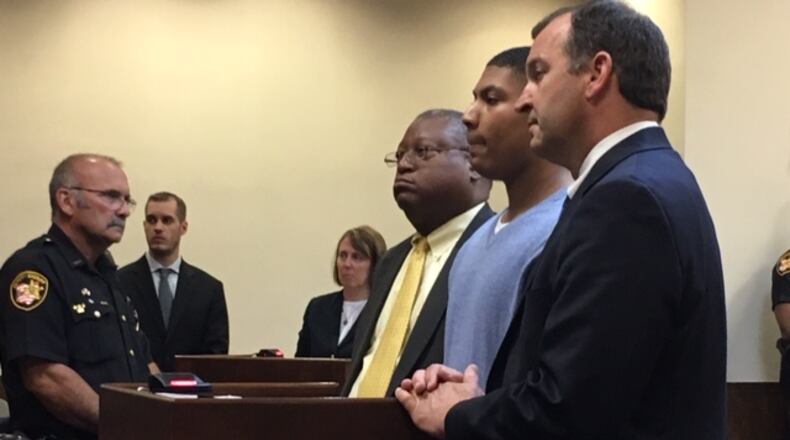But unlike Kylen Gregory’s case where he was convicted in the 2016 killing of Ronnie Bowers near that year’s Alter Fest, the other three cases ended more quickly.
“This is an uncommon case,” University of Dayton Law School Professor Emeritus Tom Hagel said of what was Kettering’s first gun-related homicide since 2007 and perhaps, police said, the first such teen-teen killing in the city’s history.
“To have it go on for three years is unusual,” Hagel added.
Reverse bind-over criminal cases – ones that go back and forth between juvenile and adult courts – often take longer, legal professionals said.
Montgomery County Prosecutor Mathias Heck Jr. calls Ohio’s reverse bind-over law “convoluted and frustrating for all.”
EARLIER: How Kettering teen homicide case evolved
Technical legal points, media publicity, “extensive” plea negotiations,“vigorous” attorneys on both sides, deliberate judges, and the challenge of coordinating the schedules all of those court officials have also been factors in this case’s pace, legal professionals said.
In the Bowers’ killing, murder charges against Gregory, his age — both he and the victim were 16 — and the use of a gun mandated the case transfer to adult court in August 2017.
In adult court, he was indicted on two counts of murder, five counts of felonious assault and other charges. When a jury found him guilty of reckless homicide — and not murder — in November 2018, that signaled the case would go back to juvenile court.
Depending on what happens in juvenile court, the case may stay there, in which case the 19-year-old Gregory would be free at age 21
If it returns to adult court, Gregory would serve 11 years in prison minus time served, and he’s been in juvenile detention for about three years. Prosecutors sought no less than 35 years.
POPULAR: Wrong-way driver changes plea in crash that killed 3 from Warren County family
“When you look at the severity of the charge, I think that contributed to the length of it,” said Ben Swift, Gregory’s co-counsel along with Jon Paul Rion. “I think everyone wanted to make sure all legal avenues were pursued from our perspective on Kylen’s behalf.
Swift, who has represented Gregory since his first court appearance, added “this was not your average case. This was a difficult and important case to the Gregory family, but to the Bowers family also.”
Reverse bind-over cases “convoluted and frustrating for all,” Heck said in a statement issued Friday, “but especially for victims and their families who have to relive the crime over and over again during all the court proceedings.”
Indeed, the emotions of Bowers’ family has been evident — and understandably so, many agree — at several points in the case. In juvenile court and adult court, an urn with the victim’s remains has made appearances — with the judges’ approval.
EARLIER: Hearing set to decide if teen will be tried as an adult in deadly Miamisburg shooting
The jury’s decision not to convict on the murder charges after Gregory testified to firing a shot that authorities said killed Bowers was particularly jarring to the family.
And Bowers’ mother — Jessica Combs — gave an extensive, heart-wrenching plea for Gregory to be given a maximum sentence of 41 years.
“There was so much damage my son Ronnie couldn’t even live as a vegetable,” Combs said during a statement that lasted more than an hour and was often interrupted by her choking on tears.
“My family is beyond devastated,” she added later.
“Prolonging a case like this,” Hagel said, “obviously keeps the death of person on the forefront of that families mind.”
Ohio law, he said, states that a family has a right to be involved in various procedures in the case.
RELATED: ‘Quirky’ law may return Kettering teen shooting death case to juvenile court
“So they are constantly churned up emotionally if this thing has not been resolved yet.” Hagel said.
That emotion has also been apparent on the issue of where the case should be decided. One of the key factors the case has been — and remains — the proper jurisdiction.
It is an issue Judges Anthony Capizzi and Dennis Langer have wrestled with, and prosecutors and defense attorneys continue to be “diametrically opposed” on, Hagel said.
Capizzi has set Oct. 7-8 for a hearing to decide if Gregory is amenable to juvenile rehabilitation or whether his case will be resolved in adult court.
-MORE COVERAGE ON THIS ISSUE:
RELATED: Judge sentences Kettering teen killer to 11 years
RELATED: Kettering teen killer pleads guilty to 5 charges to face lighter sentence
RELATED: Slain teen’s mother: Killer’s sentence ‘should terrify thousands’
BOUND OVER CASES
Since Nov. 1, 2012, 88 Montgomery County juvenile cases has been certified to be bound over to adult court. Mandatory transfers give judge’s no choice and discretionary ones are a judge’s decision. Reverse bind overs return to juvenile court, but may end up being resolved in adult court. Here is a break down:
•36 discretionary.
•33 mandatory.
•15 a combination of mandatory/discretionary based upon the various charges.
•4 reverse bind overs.
SOURCE: Montgomery County Juvenile Court
About the Author

